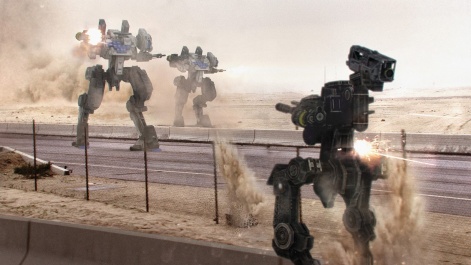Anyone who has found themselves on the beaches of Brighton for the Develop Conference every July will know that its choice of venue – the town's Hilton Metropole – ranks highly on the swanky scale.
Compared to faceless exhibition centres the world over, the Hilton in Brighton is a delicate balanace of class and character. Chillingo's chosen spot for our interview midway through the conference had that combination in spades: a breakfast room off the main foyer, delicately decorated in white and red table wear.
The colour choice – a reflection of Chillingo's own livery – was a complete coincidence, but as we remarked to the publisher's general manager Ed Rumley, it did add a certain symmetry to proceedings.
"Yes, they're coming in later to touch up the walls with paint," he joked. "It's like we've hired the whole room."
Of course, it's not as if Chillingo wouldn't have the money for such extravagances. A long time player on smartphones – Angry Birds and Cut the Rope having both been launched on its label – the firm now has the backing of Electronic Arts, giving Chillingo the kind of financial clout many other publishers on the scene would kill for.
But, as Rumley revealed, in mobile publishing, money isn't everything. In the first part of our interview with the Chillingo man, Rumley details the changes Chillingo has had to go through in order to stay relevant in the ever changing smartphone scene, and gives a hint at the evolution still to come.
Pocket Gamer: So you're down to talk at Develop tomorrow. Can you tell us a little bit about what you'll be talking about?
Ed Rumley: The overall presentation is about how publishers can help indies with freemium. This isn't about publisher versus self publishing – and I know there are big thoughts on that. I've given my views clearly – I'm very passionate about this – and my views are the world is getting harder to publish in, there's no doubt about that.
I think once upon a time an indie developers or another developer would have come along and said "hey, I want sales and marketing support", whereas if you look at it where the market is now, it's horrendously complex, and you kind of look at pay-per-download and Java and BREW fragmentation of 800 handsets – that was the good old days!
If you look at the fragmentation and where it was and the complexity of the market now – I've recently read 5,000 – 6,000 games are launched on the App Store every month – that's difficult enough. I think where a publisher can really help people nowadays is actually sharing their knowledge their experience. We've made mistakes, every company out there has made mistakes, but they are mistakes that just make you better.
Everything we do, we're assigning to new games. I'll give you an example – today we've announce Gang of Pirates. It's an amazing new freemium game coming from some developers in Finland.
It's a true multiplayer battle pirate game, and the team that have worked on things like The Simpsons: Tapped Out have looked at that game for us and we showed a couple of games at GDC – a game called Mech which is a mech battle game and a game called Street Kart. Both of those are from UK developers.
We only showed three games at GDC – one of them that's actually live, called Iron Force, and then these two games by British developers – and again, these two games, the amount of intel we're giving these guys is amazing.

So, on the racing game Street Kart, we're able to say "right ,we think you should do x, y and z" because the telemetry data we have from Real Racing 3. So it's a very powerful thing and I think that's where a publisher can really offer value.
Our number on quality is fun. You know, we start with fun and we always believe it's about putting the player first. Damp Gnat is a very good example actually. A lot of people said to us why don't you make Icycle a freemium game, and that's because it would have broken it. It's a staggering game – I think it's one of the most beautiful games ever to have come out of a Chillingo studio. We're very proud to have published that game, but if we'd gone and tried to force a square peg into a round hole, we'd have destroyed it.
Has the rise of free-to-play – and, in particular, Games as a Service – changed the way you approach your work as a publisher, would you say?
Yeah, I mean absolutely. We as an organisation have 100 percent had to change, people have had to change, jobs have changed – they're in new roles.
A lot of people said to us why don't you make Icycle a freemium game, and that's because it would have broken it.Ed Rumley
We have about two companies meetings per day – we used to have one or two company meetings a month, you know, "here's an update on sales and how things are going". But now we literally have company meetings everyday because, whether it's production, whether it's deployment - the digital lorry drivers as I like to think of them – whether it's PR, whether it's marketing, whether it's the business and sales team... you know, we've got community managers, we've got customer service.
Every single person needs to know what's going on with that product, so yeah, it's an entirely different beast and I think that's reflected in how we work as a business.
You'll remember a couple of years ago we had a lot of games. We published in excess of 115 to 120 games per year, so it was a staggering amount of content and it was a business model that worked at the time. We had all those games, Angry Birds and Anomaly as a pay per download game and we've still got Cut the Rope of course, but they're very different games, and while they have the odd update here and there, they don't require the same level of servicing.
If you take a game like Iron Force, it soft launched in June and we have the global launch in July, we've had 11 updates – well, 12 in fact, as we had an update yesterday – and every one of these updates is pretty major, and that's forgetting everything that's going on on the server side. So on a daily basis we're talking to the developer CoollFish who are based in Beijing.
It's like squeezing a balloon. You squeeze a bit here and it sticks out, and you squeeze a bit there and it's constantly sticking out. You're playing with retail economy, you're playing with session length... you're constantly trying to change the game and it's an entirely different beast.
Talking about the changing nature of the publishing scene, we've spoken to the likes of Rovio, Unityand Backflip all in recent months, all of which have their own publishing programs. How do you think their approach – releasing just a small select number of titles a year – compares to yours?
I can't comment about those companies obviously, but... third party publishing is very difficult because you're out there and you're looking for that diamond in the rough, essentially. Chillingo as a business is part of EA but we sit very differently.
When we need it we'll knock on the door and say "have you got anything you can share on the telemetry?" or "hey, we really want that additional marketing muscle you've got". A lot of our games get promoted by EA – I think today they're promoting Iron Force in FIFA for example – so I think that really benefits us.

What we're not is, we're not in a position where we say "right, we've got to sign three titles this month or two games this quarter" or whatever it is. We're not under this quota, so we never kind of compromise ourselves is what I'm saying. We're always there, we have our values and our values and they are quality and fun, and I think that's effective.
If you look at the App Store in the US, our average rating is 4.25 or 4.2 – something like that over a 12 month period. So it's an incredibly high rating. I really believe we're respected for that.
You were talking about the number of games that hit the App Store earlier. When you go about launching your own, is it a case of you hunting them out or letting developers come to you?
It's a good question. So what we don't do is go out in the morning and say "do you know what, we really need a game about...pink elephants on go-karts...
...I'd play that.
[Laughs] Well, what haven't got one, so we need to go and find a game about go-karts. No...we've got these amazing games, but they came to us. Last year we were approached by 4,200 developers – these are unique developers that came to us in 2013. In 2012 it was actually a similar number, and that had grown from 2011 if my maths is right.
So yeah, we've had a lot of growth there, and if you look at the sheer volume, it's scary. It's scary. But that's what's amazing about this market - the amount of people out there. Apple recently announced at GDC the amount of developers they have out there, and it's just a crazy number – you know, millions and millions of dev accounts out there.
Check back later in the week for part two of our interview with Ed Rumley, where he talks what developers need from a publisher in 2014, and the rise of wearables and VR tech.





















